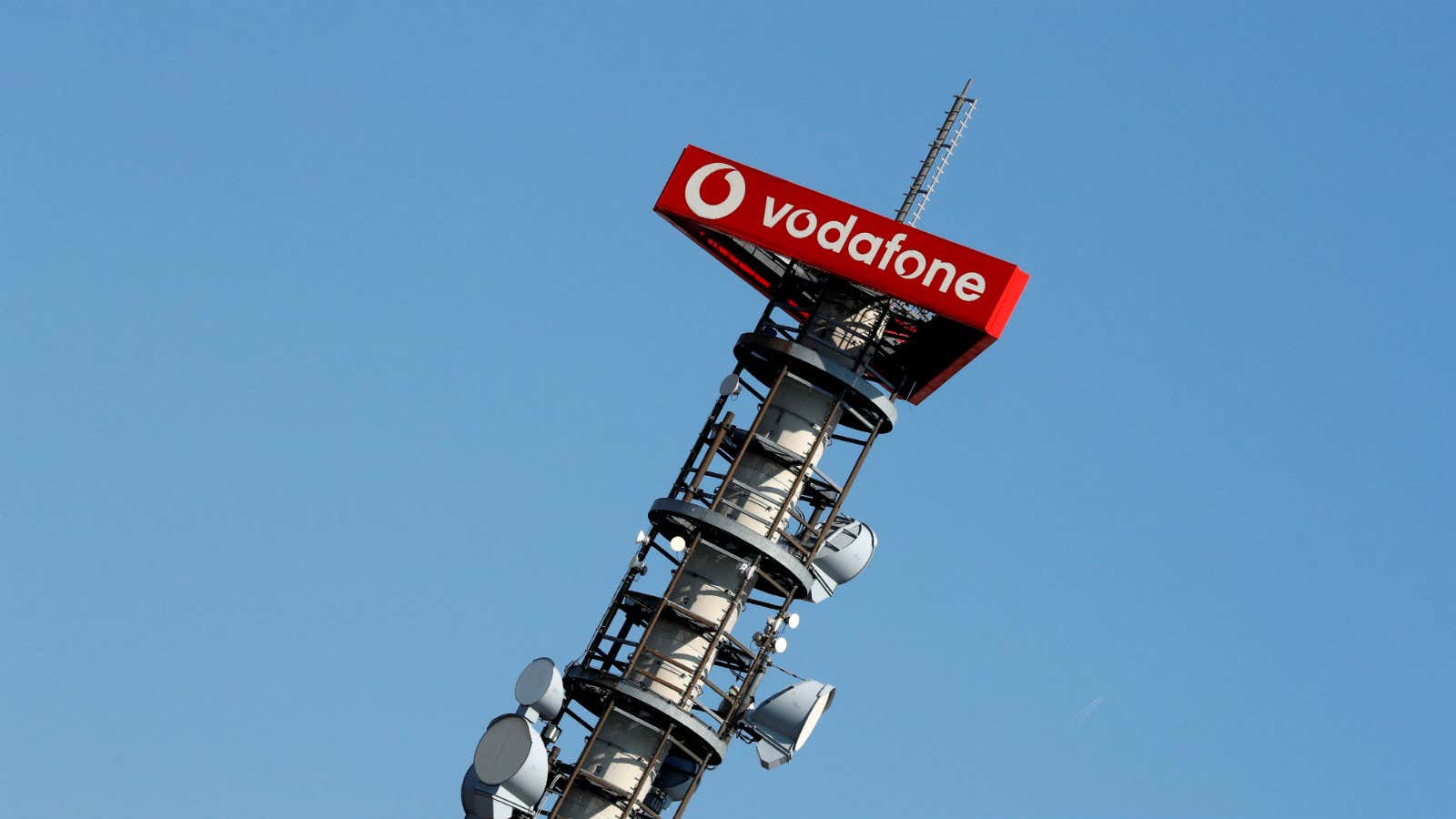Once a vibrant market with over a dozen firms, India’s telecom industry may be quickly moving towards a duopoly of sorts.
Unprecedented losses in the September quarter have cast a shadow on the operations of Vodafone Idea, India’s third-biggest telecom firm in which the UK-based Vodafone Group owns a 44% stake. The next few weeks could be critical for the company, as prime minister Narendra Modi’s government decides on relief measures for the sector stung by a recent supreme court ruling.
Reliance Jio, Vodafone Idea, and Bharti Airtel account for nearly 90% of the country’s mobile phone subscribers, whereas state-owned BSNL and MTNL, which once pioneered Indian telephony, have been consigned to the margins. Over the years, many foreign players—Norway’s Telenor, Russia’s Sistema, and Aircel, owned by Malaysia’s Maxis, to name a few—too, have exited the market that was once seen as a hotbed for foreign investment.
The consolidation, though, may not be over yet.
A dispute settled
Vodafone Idea is reeling under a Rs54,000 crore ($7.5 billion) hit following the supreme court’s Oct. 24 ruling that upheld the government’s wider definition of adjusted gross revenue (AGR).
Telecom firms pay 8% of their AGR as licence fees and between 3% and 5% as spectrum usage charges (SUC) to the government. The industry’s long-held argument that non-core revenues do not constitute AGR was dismissed by the apex court.
The ruling has created a Rs92,000-crore liability for the sector, which must be paid up in three months. This may rise to Rs1.4 lakh crore if the government raises a demand for shortfall in SUC as well.
Airtel and Vodafone Idea are estimated to face a combined hit of Rs82,000 crore. BSNL and MTNL together owe around Rs5,000 crore, while three-year-old Reliance Jio owes roughly Rs14 crore. The rest is owed by Telenor, Sistema, Tata Teleservices, Aircel, and Reliance Communications (RCOM), all of whom have exited the market.
Vodafone Idea, whose quarterly losses ballooned to Rs50,922 crore in July-September after it made provisions for the dues, is facing the maximum heat, though.
“It’s fair to say that it is a critical situation…the Indian government understands the issue and the urgency…financially there’s been a heavy burden through unsupportive regulation, excessive taxes and on top of that we got the negative supreme court decision,” Vodafone Group CEO Nick Read had told Reuters a few days before the financial results were announced on Nov. 15.
Even as it denied rumours of exiting India, the firm’s future clearly depends on some regulatory relief.
Shaky ground
Faisal Kawoosa, a telecom expert, says given the current scenario, only two private players will be left unless the government intervenes. “A government intervention is the need of the hour as telecom is part of critical/essential services. Telecom was owned by the government initially before it was privatised. Also, the industry needs to work with collaborative competition rather than rivalry.”
The journey of Vodafone in India has been tumultuous from the start. In 2007, when it bought Hutchison’s stake in India, the government raised a tax dispute of $2.2 billion. The company won the battle in court but the then UPA government changed the rules retrospectively and again raised a tax demand, which was challenged in court.
The next inflexion point came in 2016, when Reliance Jio disrupted the market with low data tariffs and free voice calls. Vodafone India and rival Idea Cellular then decided to merge in 2018.
Following the merger, Vodafone has been at odds to lose out as its profitability nosedived.
Road ahead
Subsequent to the SC order on AGR, a committee of secretaries (CoS) has been set up to examine the financial stress in the sector. The bureaucrats, headed by cabinet secretary Rajiv Gauba, will also look into demands of the industry, including deferment in spectrum payment for two financial years.
Experts say the financial health of the telecom sector needs to improve, which can happen only by raising tariffs and through policy support.
The rationalisation of levies has been a long-standing demand of the telecom industry, which has gained strength in the past few years. The government’s new telecom policy, announced last year, talked about it briefly but no specifics have been declared. The CoS will look into this aspect as well.
Meanwhile, the department of telecommunications has already sent out notices asking the firms to pay the licence fee dues in accordance with the supreme court order.
The Modi government’s decision will determine the future of the industry.
We welcome your comments at ideas.india@qz.com.
